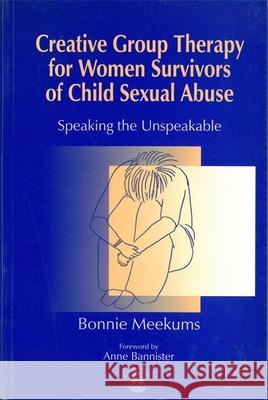Creative Group Therapy for Women Survivors of Child Sexual Abuse: Speaking the Unspeakable » książka
Creative Group Therapy for Women Survivors of Child Sexual Abuse: Speaking the Unspeakable
ISBN-13: 9781853024535 / Angielski / Miękka / 2000 / 224 str.
'This is a very well written and readable book balancing academic research and practitioner orientation. This balance is seen in the division of this book into two equal parts: "Theoretical Concerns" and "The Practice'. Indeed, Meekums says she had workers in mental health settings in mind when she wrote the book.This book is a good read, but is also much more an informative guide to practitioners interested in understanding more about the therapeutic issues related to sexually abused clients and also a useful resource for those who are looking to set up a group for survivors.' - Mental Health & Learning Disabilities Care 'This book is a well-structured, sensitive and practical exploration of a multi-method approach to the language of healing. The book offers a springboard for creative thinking. It affirms the transformative power of witnessing and the ability of each survivor to "reclaim her own land." It contains ideas and insights about the survivor's journey from striving to thriving, which will be useful to a range of practitioners whether or not they use group work. For anyone engaged in the latter, this book is a must. I hope that it will also be used by managers and supervisors to appraise treatment resources and professional supervisory needs. In the present climate dominated by the debate about real or false memories, it is a courageous work and does not shirk this issue.' - Community Care Bonnie Meekums presents creative groupwork strategies and techniques for professionals working with women who have experienced child sexual abuse. The practical strategies have been developed from an understanding of the complex process of recovery, and are informed by the voices of women who have been abused in childhood themselves. The book is divided into two parts. The first looks at the theoretical issues, exploring the nature of abuse and patterns of recovery and also considers the debate about false memory syndrome'. The second part of the book presents practical group strategies, detailing a full sequence of creative exercises for the sessions. The author outlines how to set up the group, how to establish the group and how to manage group endings. The material in the book has been successfully trialled in a variety of professional settings, including a specialist multi-modal arts therapy program with a group of fourteen women. Creative Group Therapy for Women Survivors of Child Sexual Abuse will enable professionals and students to understand and support women through the difficult process of recovery from childhood sexual abuse.











